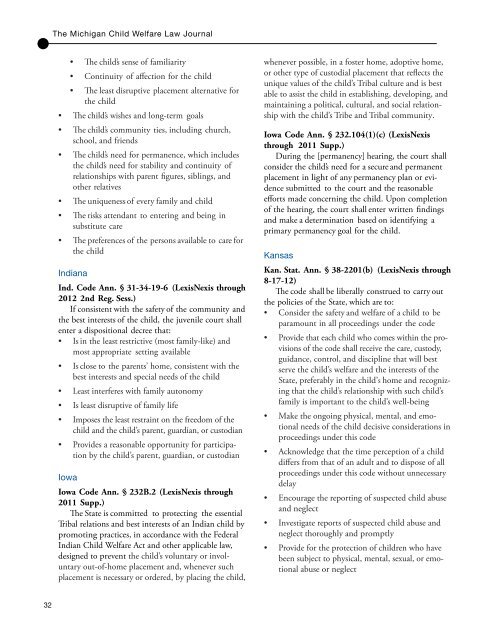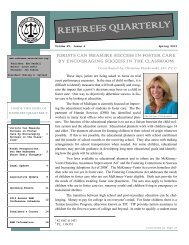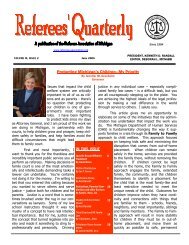The Michigan Child Welfare Law Journal - Referees Association of ...
The Michigan Child Welfare Law Journal - Referees Association of ...
The Michigan Child Welfare Law Journal - Referees Association of ...
Create successful ePaper yourself
Turn your PDF publications into a flip-book with our unique Google optimized e-Paper software.
•<br />
<strong>The</strong> <strong>Michigan</strong> <strong>Child</strong> <strong>Welfare</strong> <strong>Law</strong> <strong>Journal</strong><br />
• <strong>The</strong> child’s sense <strong>of</strong> familiarity<br />
• Continuity <strong>of</strong> affection for the child<br />
• <strong>The</strong> least disruptive placement alternative for<br />
the child<br />
• <strong>The</strong> child’s wishes and long-term goals<br />
• <strong>The</strong> child’s community ties, including church,<br />
school, and friends<br />
• <strong>The</strong> child’s need for permanence, which includes<br />
the child’s need for stability and continuity <strong>of</strong><br />
relationships with parent figures, siblings, and<br />
other relatives<br />
• <strong>The</strong> uniqueness <strong>of</strong> every family and child<br />
• <strong>The</strong> risks attendant to entering and being in<br />
substitute care<br />
• <strong>The</strong> preferences <strong>of</strong> the persons available to care for<br />
the child<br />
Indiana<br />
Ind. Code Ann. § 31-34-19-6 (LexisNexis through<br />
2012 2nd Reg. Sess.)<br />
If consistent with the safety <strong>of</strong> the community and<br />
the best interests <strong>of</strong> the child, the juvenile court shall<br />
enter a dispositional decree that:<br />
• Is in the least restrictive (most family-like) and<br />
most appropriate setting available<br />
• Is close to the parents’ home, consistent with the<br />
best interests and special needs <strong>of</strong> the child<br />
• Least interferes with family autonomy<br />
• Is least disruptive <strong>of</strong> family life<br />
• Imposes the least restraint on the freedom <strong>of</strong> the<br />
child and the child’s parent, guardian, or custodian<br />
• Provides a reasonable opportunity for participation<br />
by the child’s parent, guardian, or custodian<br />
Iowa<br />
Iowa Code Ann. § 232B.2 (LexisNexis through<br />
2011 Supp.)<br />
<strong>The</strong> State is committed to protecting the essential<br />
Tribal relations and best interests <strong>of</strong> an Indian child by<br />
promoting practices, in accordance with the Federal<br />
Indian <strong>Child</strong> <strong>Welfare</strong> Act and other applicable law,<br />
designed to prevent the child’s voluntary or involuntary<br />
out-<strong>of</strong>-home placement and, whenever such<br />
placement is necessary or ordered, by placing the child,<br />
whenever possible, in a foster home, adoptive home,<br />
or other type <strong>of</strong> custodial placement that reflects the<br />
unique values <strong>of</strong> the child’s Tribal culture and is best<br />
able to assist the child in establishing, developing, and<br />
maintaining a political, cultural, and social relationship<br />
with the child’s Tribe and Tribal community.<br />
Iowa Code Ann. § 232.104(1)(c) (LexisNexis<br />
through 2011 Supp.)<br />
During the [permanency] hearing, the court shall<br />
consider the child’s need for a secure and permanent<br />
placement in light <strong>of</strong> any permanency plan or evidence<br />
submitted to the court and the reasonable<br />
efforts made concerning the child. Upon completion<br />
<strong>of</strong> the hearing, the court shall enter written findings<br />
and make a determination based on identifying a<br />
primary permanency goal for the child.<br />
Kansas<br />
Kan. Stat. Ann. § 38-2201(b) (LexisNexis through<br />
8-17-12)<br />
<strong>The</strong> code shall be liberally construed to carry out<br />
the policies <strong>of</strong> the State, which are to:<br />
• Consider the safety and welfare <strong>of</strong> a child to be<br />
paramount in all proceedings under the code<br />
• Provide that each child who comes within the provisions<br />
<strong>of</strong> the code shall receive the care, custody,<br />
guidance, control, and discipline that will best<br />
serve the child’s welfare and the interests <strong>of</strong> the<br />
State, preferably in the child’s home and recognizing<br />
that the child’s relationship with such child’s<br />
family is important to the child’s well-being<br />
• Make the ongoing physical, mental, and emotional<br />
needs <strong>of</strong> the child decisive considerations in<br />
proceedings under this code<br />
• Acknowledge that the time perception <strong>of</strong> a child<br />
differs from that <strong>of</strong> an adult and to dispose <strong>of</strong> all<br />
proceedings under this code without unnecessary<br />
delay<br />
• Encourage the reporting <strong>of</strong> suspected child abuse<br />
and neglect<br />
• Investigate reports <strong>of</strong> suspected child abuse and<br />
neglect thoroughly and promptly<br />
• Provide for the protection <strong>of</strong> children who have<br />
been subject to physical, mental, sexual, or emotional<br />
abuse or neglect<br />
32







